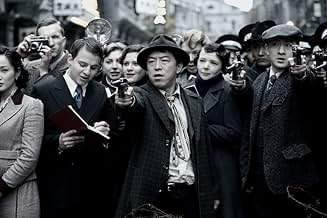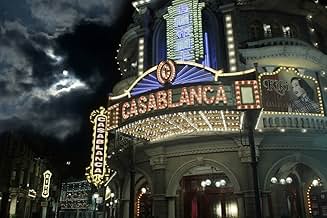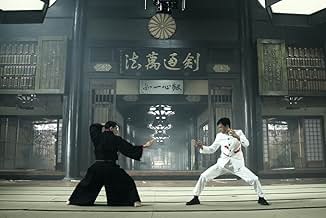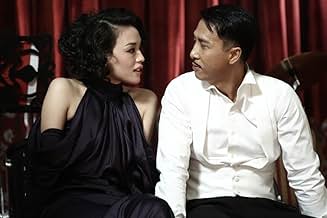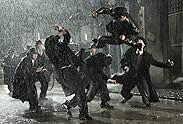ÉVALUATION IMDb
6,2/10
11 k
MA NOTE
Ajouter une intrigue dans votre langueThe year is 1917 and Chen Zhen, believed to be dead, returns to Shanghai under a false name. He joins a mob boss for info on the Japanese incl. a long kill list and at night fights the Japan... Tout lireThe year is 1917 and Chen Zhen, believed to be dead, returns to Shanghai under a false name. He joins a mob boss for info on the Japanese incl. a long kill list and at night fights the Japanese masked.The year is 1917 and Chen Zhen, believed to be dead, returns to Shanghai under a false name. He joins a mob boss for info on the Japanese incl. a long kill list and at night fights the Japanese masked.
- Prix
- 4 nominations au total
Anthony Chau-Sang Wong
- Liu Yutian
- (as Anthony Wong)
Ryu Kohata
- Colonel Takeshi Chikaraishi
- (as Kohata Ryuichi)
Histoire
Le saviez-vous
- AnecdotesThe film featured two actors who had portrayed Ip Man. Donnie Yen played the character in the "Ip Man" trilogy and Anthony Chau-Sang Wong played him in Ip Man: The Final Fight (2013).
- GaffesThe original movie The Green Hornet is mentioned in the movie, while it is part of the homage to Bruce Lee, the movie came out in 1940, 15 years after the movie takes place.
- ConnexionsFeatured in At the Movies: Venice Film Festival 2010 (2010)
Commentaire en vedette
Chen Zhen's first big-screen incarnation was the Bruce Lee classic "Fist of Legend" and forty years since then, the part of the fictional martial arts hero most famous for resisting the Japanese occupation of Shanghai has been played by many actors including Jet Li and Donnie Yen himself. The return of Donnie to the role since playing it in a 1995 ATV series shouldn't be surprising- after all, with both the Ip Man films and Bodyguards and Assassins, Donnie has been at the forefront of a recent wave of Hong Kong-China big-budget co-productions with strong Chinese nationalistic sentiment.
True to the character's origins, this latest entry into the Chen Zhen mythology trades heavily in chest-thumping patriotism. Chen Zhen/ Donnie Yen's enemies are once again the Japanese- this time in glitzy 1920s Shanghai, an era when the city was divided along the lines of different expatriate factions. The Japanese though were the most ambitious and aggressive, eager to take advantage of a disunited China to conquer the motherland. While an offshore and offscreen naval campaign was ongoing, their strategy in Shanghai was to target locals and foreigners opposed to their plan of expansion.
Donning a black suit and mask, Chen Zhen takes it upon himself to stop the wave of assassinations sweeping the city. Comparisons to Jet Li's Black Mask (1996) and The Green Hornet are inevitable, but Andrew Lau's story of the avenging hero bears even more resemblance to Batman, seeing as how Chen Zhen gets help from Huang Bo's local police constable (a la Commissioner Gordon). Lau's film however refuses to rest easy on one genre, eager to exploit its historical backdrop to deliver an old- fashioned thriller.
And so his Shanghai is one abound with Japanese spies, even in wealthy businessman Liu Yiutian's (Anthony Wong) flashy nightclub Casablanca where Chen Zhen hangs out to observe the politicking among the Westerners and the Japanese. Lau uses the tension between the various camps to keep up a fair amount of intrigue throughout the film, especially as Chen Zhen's underground resistance movement struggles to keep ahead of the stronger and more organised Japanese forces.
Amidst the suspense, the script by no less than four writers (including producer Gordon Chan) also throws in a love story between Chen Zhen and nightclub singer Kiki (Shu Qi), but the addition that was supposed to provide emotional payoff falls far short. So too the relationships between the other characters in the film- whether Chen Zhen's bond with his sister and his compatriots, or his friendship with Liu Yutian. Indeed, these interactions are given short shrift, and Lau fails to delineate them as much as he fails in fleshing out the various characters.
That is a problem especially for Chen Zhen, whose motivations for leading the resistance- other than teaching the Japanese that "Chinese are not the sick men of Asia"- aren't exactly clear. It is also tricky because the audience is not led to feel the level of indignation as Chen Zhen is supposed to, the kind of indignation that made the Ip Man films so satisfying to watch at the end- so the climax between Chen Zhen and an entire dojo of Japanese students and their master just doesn't turn out as emotionally rewarding as one would expect it to.
Those looking for Donnie Yen to kick ass should also lower their expectations. Unlike the Ip Man films, Donnie doesn't get much time here to show off his agility and prowess- thanks to Lau's frenetic efforts to develop a script chock full of undercooked subplots. That is a pity, because one would certainly like to see more of the fast, furious and lethal action that Donnie has on display during the breathtaking opening sequence (to whet your appetite, Chen Zhen uses bayonet knives to take out a section of enemy soldiers on the second floor of a building, running at a 30-degree angle up a pole, and then using the knives to scale up the wall). There are just two more big action setpieces after this before the finale, but what visceral excitement Donnie generates in both is extinguished far too quickly.
For what he falls short in the martial arts sequences, Andrew Lau tries to make up for in flashy visuals and lush cinematography. As with his other films, the director who started out as an acclaimed cinematographer takes up lensing duties here and his photography of 1920s Shanghai is grand and opulent. Nevertheless, most audiences would probably prefer to see Donnie Yen's fighting than Lau's gorgeous cinematography, and will find the latter inadequate compensation for the former.
Fans of Donnie Yen however should still find reason to rejoice. Chen Zhen sees Donnie Yen at his most suave and charismatic (even looking convincingly like he can play a piano). He is also a much better actor now, and the dramatic scenes possess none of the awkwardness that used to dwarf his earlier films. Perhaps most importantly, the exhilarating action sequences show that he has lost none of his mettle as the best martial arts star in Chinese cinema right now. For a younger generation who may not have seen Bruce Lee and his nanchucks in the original "Fist of Legend", Donnie Yen's take on Chen Zhen is iconic enough to leave a lasting impression.
True to the character's origins, this latest entry into the Chen Zhen mythology trades heavily in chest-thumping patriotism. Chen Zhen/ Donnie Yen's enemies are once again the Japanese- this time in glitzy 1920s Shanghai, an era when the city was divided along the lines of different expatriate factions. The Japanese though were the most ambitious and aggressive, eager to take advantage of a disunited China to conquer the motherland. While an offshore and offscreen naval campaign was ongoing, their strategy in Shanghai was to target locals and foreigners opposed to their plan of expansion.
Donning a black suit and mask, Chen Zhen takes it upon himself to stop the wave of assassinations sweeping the city. Comparisons to Jet Li's Black Mask (1996) and The Green Hornet are inevitable, but Andrew Lau's story of the avenging hero bears even more resemblance to Batman, seeing as how Chen Zhen gets help from Huang Bo's local police constable (a la Commissioner Gordon). Lau's film however refuses to rest easy on one genre, eager to exploit its historical backdrop to deliver an old- fashioned thriller.
And so his Shanghai is one abound with Japanese spies, even in wealthy businessman Liu Yiutian's (Anthony Wong) flashy nightclub Casablanca where Chen Zhen hangs out to observe the politicking among the Westerners and the Japanese. Lau uses the tension between the various camps to keep up a fair amount of intrigue throughout the film, especially as Chen Zhen's underground resistance movement struggles to keep ahead of the stronger and more organised Japanese forces.
Amidst the suspense, the script by no less than four writers (including producer Gordon Chan) also throws in a love story between Chen Zhen and nightclub singer Kiki (Shu Qi), but the addition that was supposed to provide emotional payoff falls far short. So too the relationships between the other characters in the film- whether Chen Zhen's bond with his sister and his compatriots, or his friendship with Liu Yutian. Indeed, these interactions are given short shrift, and Lau fails to delineate them as much as he fails in fleshing out the various characters.
That is a problem especially for Chen Zhen, whose motivations for leading the resistance- other than teaching the Japanese that "Chinese are not the sick men of Asia"- aren't exactly clear. It is also tricky because the audience is not led to feel the level of indignation as Chen Zhen is supposed to, the kind of indignation that made the Ip Man films so satisfying to watch at the end- so the climax between Chen Zhen and an entire dojo of Japanese students and their master just doesn't turn out as emotionally rewarding as one would expect it to.
Those looking for Donnie Yen to kick ass should also lower their expectations. Unlike the Ip Man films, Donnie doesn't get much time here to show off his agility and prowess- thanks to Lau's frenetic efforts to develop a script chock full of undercooked subplots. That is a pity, because one would certainly like to see more of the fast, furious and lethal action that Donnie has on display during the breathtaking opening sequence (to whet your appetite, Chen Zhen uses bayonet knives to take out a section of enemy soldiers on the second floor of a building, running at a 30-degree angle up a pole, and then using the knives to scale up the wall). There are just two more big action setpieces after this before the finale, but what visceral excitement Donnie generates in both is extinguished far too quickly.
For what he falls short in the martial arts sequences, Andrew Lau tries to make up for in flashy visuals and lush cinematography. As with his other films, the director who started out as an acclaimed cinematographer takes up lensing duties here and his photography of 1920s Shanghai is grand and opulent. Nevertheless, most audiences would probably prefer to see Donnie Yen's fighting than Lau's gorgeous cinematography, and will find the latter inadequate compensation for the former.
Fans of Donnie Yen however should still find reason to rejoice. Chen Zhen sees Donnie Yen at his most suave and charismatic (even looking convincingly like he can play a piano). He is also a much better actor now, and the dramatic scenes possess none of the awkwardness that used to dwarf his earlier films. Perhaps most importantly, the exhilarating action sequences show that he has lost none of his mettle as the best martial arts star in Chinese cinema right now. For a younger generation who may not have seen Bruce Lee and his nanchucks in the original "Fist of Legend", Donnie Yen's take on Chen Zhen is iconic enough to leave a lasting impression.
- moviexclusive
- 15 sept. 2010
- Lien permanent
Meilleurs choix
Connectez-vous pour évaluer et surveiller les recommandations personnalisées
- How long is Legend of the Fist: The Return of Chen Zhen?Propulsé par Alexa
Détails
- Date de sortie
- Pays d’origine
- Sites officiels
- Langues
- Aussi connu sous le nom de
- Legend of the Fist: The Return of Chen Zhen
- sociétés de production
- Consultez plus de crédits d'entreprise sur IMDbPro
Box-office
- Brut – États-Unis et Canada
- 50 433 $ US
- Fin de semaine d'ouverture – États-Unis et Canada
- 11 365 $ US
- 24 avr. 2011
- Brut – à l'échelle mondiale
- 27 390 678 $ US
- Durée1 heure 46 minutes
- Couleur
- Mixage
- Rapport de forme
- 2.35 : 1
Contribuer à cette page
Suggérer une modification ou ajouter du contenu manquant

Lacune principale
By what name was Jing wu feng yun: Chen Zhen (2010) officially released in India in English?
Répondre






